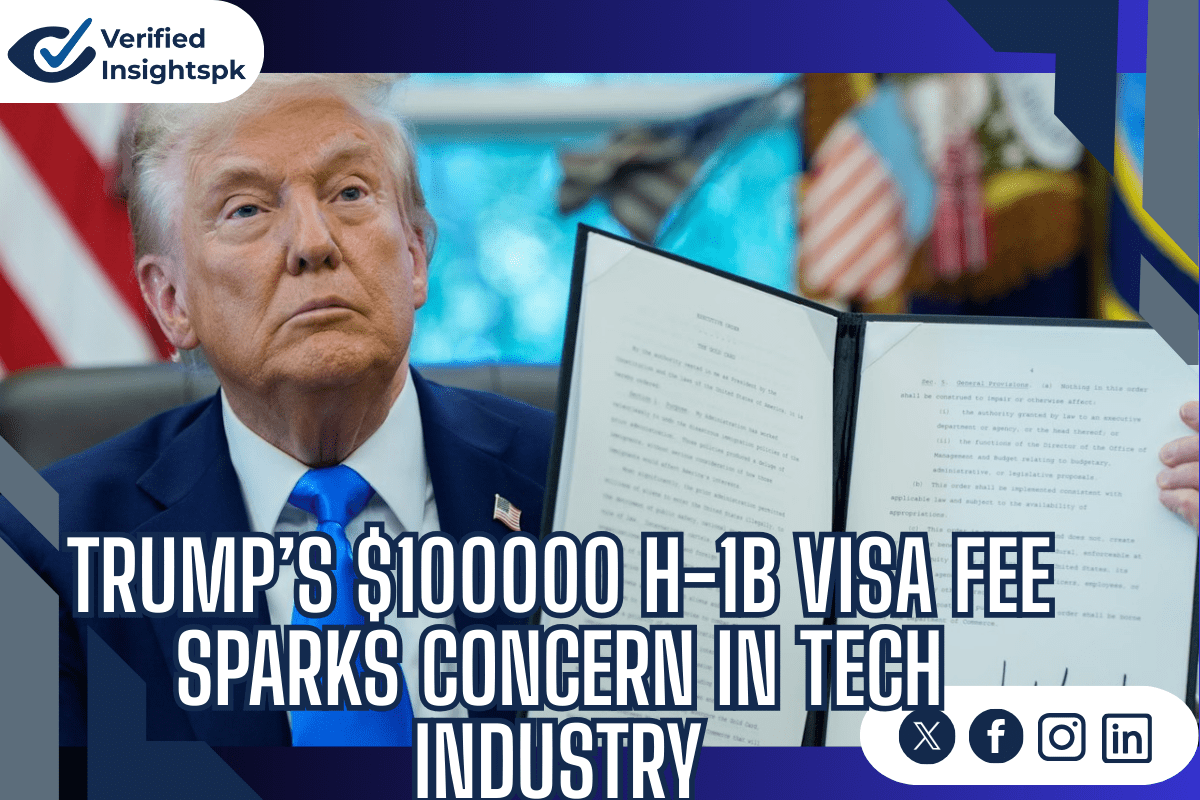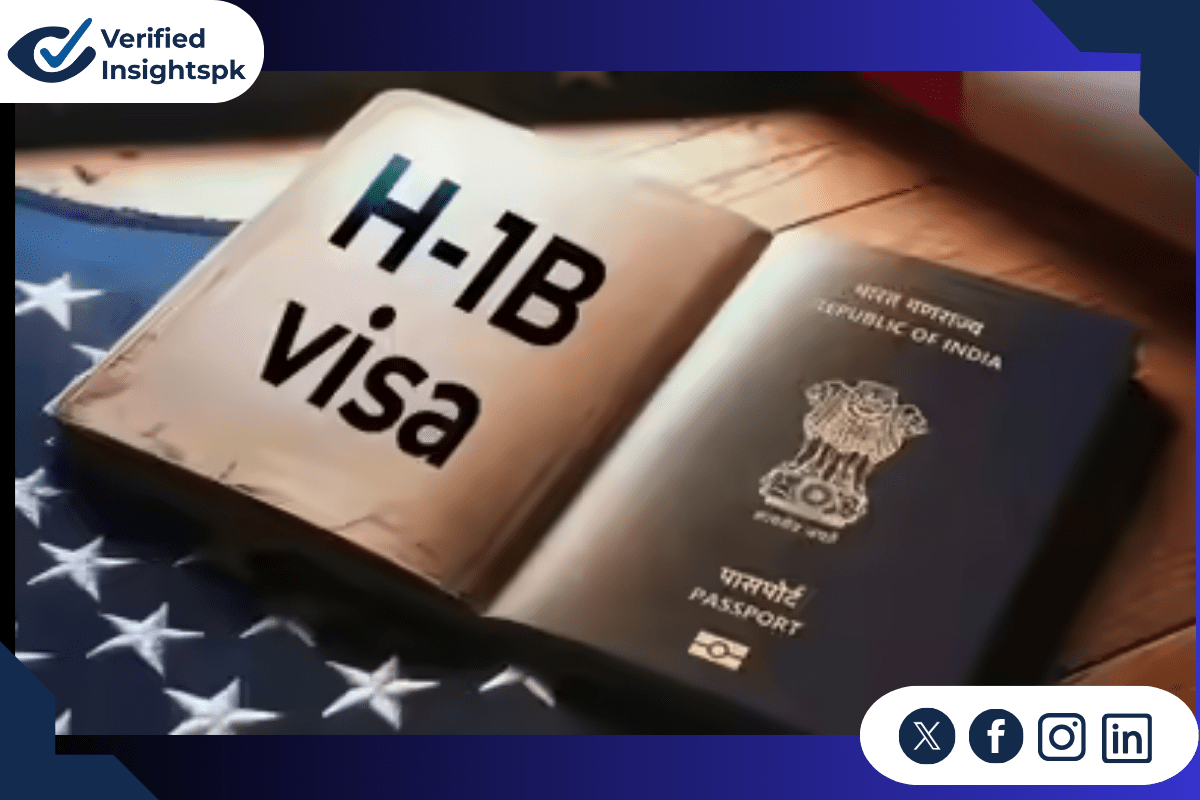
Trump’s $100000 H-1B Visa Fee Sparks Concern in Tech Industry
The U.S. technology sector is facing fresh uncertainty after the Trump administration announced a sweeping change to the H-1B visa program. Under the new policy, companies may be required to pay an annual fee of $100,000 for every H-1B worker they employ.
The move has sent shockwaves through Silicon Valley and beyond, as tech companies rely heavily on skilled talent from countries such as India and China. Industry leaders warn the measure could slow innovation, drive up costs, and disrupt the workforce pipeline. Let’s explore further the $100000 H-1B Visa fee.
What is $100000 H-1B Visa?

The H-1B visa program enables U.S. companies to employ highly skilled foreign workers, particularly in fields such as technology, engineering, and medicine. For decades, it has been a key pathway for international talent to contribute to the U.S. economy. So this $100000 H-1B Visa Fee has become the sensation these days.
- Who benefits? Tech giants, startups, research firms, and universities.
- Top countries of origin: India and China account for the majority of H-1B holders.
- Duration: Typically issued for three years, with the option to be extended up to six years.
Trump’s Push for “American Jobs First”
Since taking office, President Trump has aggressively reshaped U.S. immigration policy. The $100000 H-1B Visa annual fee represents the most high-profile attempt yet to rework temporary employment visas.
“If you’re going to train somebody, train recent graduates from our universities,” said Commerce Secretary Howard Lutnick. “Stop bringing in people to take our jobs.”
This statement underscores the administration’s “Hire American” agenda, which aims to reduce reliance on foreign labor and create more opportunities for U.S. citizens.
Tech Industry Reaction
The response from the technology sector has been swift and alarmed. Internal emails from companies such as Microsoft, Amazon, and JPMorgan advised H-1B visa holders to avoid international travel and remain in the United States until further clarity is issued.
- Employees currently outside the U.S. were urged to return before the new fee structure takes effect.
- Visa holders inside the U.S. were warned against travel to prevent re-entry complications.
The urgency highlights how deeply embedded foreign talent is in the tech workforce.
Why $100000 H-1B Visas Matters for Tech Companies
1. Increased Costs
A $100000 H-1B Visa annual fee per worker could make employing foreign talent prohibitively expensive.
2. Talent Shortages
Many roles in AI, software engineering, and data science already face shortages of qualified American workers.
3. Innovation Risk
Limiting access to global talent may slow down innovation in a highly competitive international market.
Supporters vs. Critics of H-1B
The H-1B debate has long divided policymakers, workers, and companies:
-
Critics argue:
- The program depresses wages.
- It allows companies to replace American workers with cheaper foreign labor.
- It sidelines U.S. graduates who could take these jobs.
-
Supporters argue:
- It fills critical skill gaps that U.S. labor markets cannot meet.
- It keeps U.S. firms globally competitive.
- It fosters innovation by bringing in diverse, highly skilled minds.
Even Elon Musk, a naturalized U.S. citizen and former H-1B holder, has voiced support for the program, noting its importance in building companies like Tesla and SpaceX.
The Bigger Picture: Immigration Policy Shift
This visa fee announcement is part of a broader crackdown on immigration. Trump’s administration has already:
- Limited some forms of legal immigration.
- Tightened green card and asylum processes.
- Increased scrutiny of work visa applications.
By targeting the H-1B program, the administration is signaling a direct challenge to the tech sector, which contributed millions of dollars to Trump’s presidential campaign but now finds itself at odds with his immigration stance.
What Comes Next?
- Legal Battles Likely: Tech companies and immigration advocates may challenge the fee in courts.
- Visa Holder Anxiety: Thousands of workers are uncertain about their future in the U.S.
- Global Implications: Countries like Canada, Australia, and the U.K. may attract displaced talent, benefiting from the U.S. restrictions.
Key Takeaways
- The Trump administration proposes a $100000 H-1B visa fee annually.
- Tech giants, including Microsoft, Amazon, and JPMorgan, urge visa holders to remain in the U.S.
- Critics argue that the H-1B program undercuts American workers, while supporters emphasize its role in driving innovation and competitiveness.
- The move reflects a broader immigration crackdown that may reshape the U.S. tech industry.
Conclusion
The silent battle over the H-1B program is more than an immigration issue; it is about the future of the U.S. technology sector. As companies brace for higher costs and uncertainty, the global race for talent may tilt away from America.
For now, thousands of skilled workers and the companies that depend on them are left waiting for clarity in an increasingly volatile immigration landscape.










